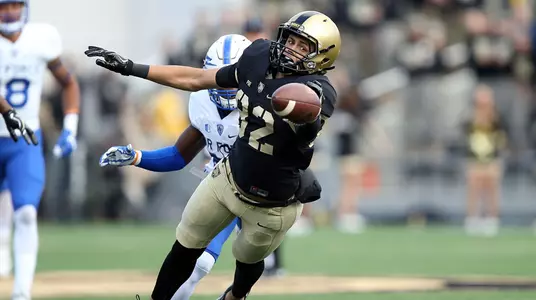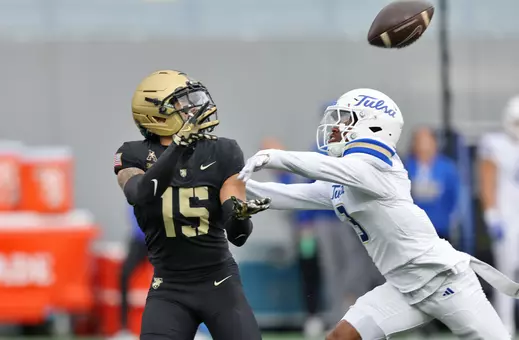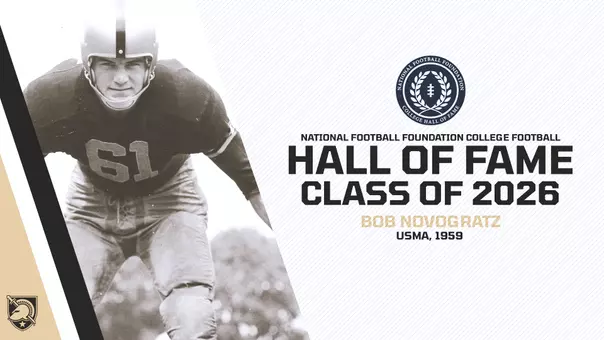Army West Point Athletics

Feinstein's Findings: Tough One to Swallow
November 06, 2016 | Football
New York Times bestselling author, John Feinstein, will report on the Black Knights after each football game during the 2016 season. The weekly report will be posted to GoArmyWestPoint.com following each battle on the gridiron.
This one hurt.
There's no other way to describe Army's 31-12 loss to Air Force on Saturday at Michie Stadium. Losing to the Falcons is never fun but this one was a little different if only because of the legitimate expectations the Black Knights had going into the game.
Both teams were 5-3. Air Force had just ended a three game losing streak a week earlier with an un-impressive win over a 1-8 Fresno State team that had fired its coach earlier that week. The Falcons actually trailed 21-17 in the third quarter before quarterback Nate Romine's bad luck turned out to be the team's good luck. More on that later.
Army, on the other hand, had pulled out of its October doldrums with a solid 21-13 road victory over a good (5-2) Wake Forest team. Coach Jeff Monken made the point during the week that he thought his team was still improving. The Wake Forest game was evidence of that.
At the very least, this was going to be a down-to-the-wire game, one where a key play or call; a critical turnover; a heroic moment—would decide.
For almost three quarters, it looked like just that sort of game. The Falcons led 10-6 at halftime after the Black Knights pieced together a late six-play, 65-yard drive that was climaxed by Kell Walker scampering 32 yards into the end zone with 1:19 to play. Blake Wilson's extra point was blocked—more problems for the kicking game—but it was a four-point game at the break.
Then the teams traded long drives to start the third quarter. Army went for two after its touchdown trying to make up for the lost extra point and failed. It was 17-12 and the blocked kick loomed large.
And then it didn't.
Air Force quickly marched 70 yards in six plays with Tim McVey's four-yard run providing the touchdown. The extra point made it 24-12.
Army went three-and-out. So did Air Force—the defense rising up to finally force a punt. But then the Army offense went three-and-out again at the start of the fourth quarter. That was enough for the Zoomies who, after a short punt, only needed six plays to go 55 yards with quarterback Arion Worthman going the final four yards.
It was apt that it would be Worthman who went those final four yards to up the lead to 31-12 because he was Army's kryptonite all day.
Which is where the Fresno State game comes in. Playing on a Friday night, Air Force was in trouble against a bad team. The Falcons had already dropped three straight and their once promising season, was spiraling. They had been 4-0 after beating Navy, but midway through the third quarter they trailed 21-17.
Then redshirt junior Nate Romine went down with a sprained ankle. Enter Worthman, a 6-foot, 200-pound sophomore who had impressed people with his speed and strength in practice but had rushed the ball once and thrown it once (both in the opener) to that point in the season.
Worthman promptly ran the ball 20 times for 102 yards in less than two quarters and led Air Force on two touchdown drives that won the game. And so, the question as the Falcons came east was, 'who would Troy Calhoun start at quarterback?'
To say that Calhoun is a close-to-the-vest kind of guy is a little bit like saying there's been some animosity between the two presidential candidates this fall. Ask Calhoun what he had for breakfast and he'll tell you how much he respects eggs-and-bacon, but also loves pancakes.
Romine was in uniform on Saturday, but Worthman got the start. Romine may end up being Air Force's Wally Pipp. Getting Worthman out of the lineup is going to be difficult.
It wasn't just that he completed six-of-nine passes for 195 yards—104 of them in the first half to Jalen Robinette, who, along with safety Weston Steelhammer has apparently been at Air Force since the Fisher DeBerry era. At least it feels that way.
It also wasn't Worthman's 63 yards rushing that hurt Army most. It was that he kept making PLAYS. He scrambled, he darted, he found receivers when he had to, notably on the 46-yard touchdown pass he threw to Jacobi Owens on the first possession of the third quarter.
In all, there is no getting around the fact that Air Force was the better team on Saturday. Statistics often lie, but not in this game. Army was out-rushed, 249 yards to 144 yards—the latter number 200 yards less than the Cadets season average. Air Force had almost twice as many yards in total offense: 444-228. They had more time-of-possession, but that number was deceptively close because the Falcons pieced together a number of lengthy drives that didn't take that long: Ten plays 77 yards (to a field goal); three plays, 55 yards; seven plays 75 yards; 10 plays 76 yards; six plays 55 yards.
Perhaps that was the most surprising aspect of the afternoon: the inability of the Army defense to get off the field. The defense has been the heart-and-soul of this team all fall. It was giving up 16.5 points-per-game coming in and many of those points had come on short field drives created by turnovers.
That wasn't the case Saturday. Both Army turnovers came on end zone interceptions. The first one was critical because it came soon after Alex Aukerman had jumped on a fumble created by Andrew King at the Air Force 17-yard line. If the Black Knights had taken the lead then with the first score of the game, who knows what might have happened?
But that's a wild and irrelevant hypothetical. What happened was that Air Force's offense marched up and down the field in a manner no team has against Army's defense all season. And, when the offense needed to pick up the defense with the score 24-12 and hope still alive, it went three-and-out--twice.
The Commander-in-Chiefs Trophy is headed back to Colorado Springs. It will now be at least 21 years between CIC's for Army.
There's no sense dwelling on all the sad numbers connected to the Army-Air Force rivalry in the 20 years since the Independence Bowl team beat the Falcons and went on to win the CIC with President Bill Clinton in attendance on a cold, wet, miserable—but ultimately beautiful—December afternoon in Philadelphia.
What matters right now is for Monken and his players to find a way to put this behind them and focus on playing a vulnerable Notre Dame team next week. The Irish are 3-6 after losing to Navy Saturday and will no doubt arrive in San Antonio in a bad mood.
Army's mood probably won't be much better.
"Words can't describe this disappointment," Monken said Saturday.
He's absolutely right. The thing to do now is not worry about words but find a way to turn them into deeds in the next seven days.
This one hurt.
There's no other way to describe Army's 31-12 loss to Air Force on Saturday at Michie Stadium. Losing to the Falcons is never fun but this one was a little different if only because of the legitimate expectations the Black Knights had going into the game.
Both teams were 5-3. Air Force had just ended a three game losing streak a week earlier with an un-impressive win over a 1-8 Fresno State team that had fired its coach earlier that week. The Falcons actually trailed 21-17 in the third quarter before quarterback Nate Romine's bad luck turned out to be the team's good luck. More on that later.
Army, on the other hand, had pulled out of its October doldrums with a solid 21-13 road victory over a good (5-2) Wake Forest team. Coach Jeff Monken made the point during the week that he thought his team was still improving. The Wake Forest game was evidence of that.
At the very least, this was going to be a down-to-the-wire game, one where a key play or call; a critical turnover; a heroic moment—would decide.
For almost three quarters, it looked like just that sort of game. The Falcons led 10-6 at halftime after the Black Knights pieced together a late six-play, 65-yard drive that was climaxed by Kell Walker scampering 32 yards into the end zone with 1:19 to play. Blake Wilson's extra point was blocked—more problems for the kicking game—but it was a four-point game at the break.
Then the teams traded long drives to start the third quarter. Army went for two after its touchdown trying to make up for the lost extra point and failed. It was 17-12 and the blocked kick loomed large.
And then it didn't.
Air Force quickly marched 70 yards in six plays with Tim McVey's four-yard run providing the touchdown. The extra point made it 24-12.
Army went three-and-out. So did Air Force—the defense rising up to finally force a punt. But then the Army offense went three-and-out again at the start of the fourth quarter. That was enough for the Zoomies who, after a short punt, only needed six plays to go 55 yards with quarterback Arion Worthman going the final four yards.
It was apt that it would be Worthman who went those final four yards to up the lead to 31-12 because he was Army's kryptonite all day.
Which is where the Fresno State game comes in. Playing on a Friday night, Air Force was in trouble against a bad team. The Falcons had already dropped three straight and their once promising season, was spiraling. They had been 4-0 after beating Navy, but midway through the third quarter they trailed 21-17.
Then redshirt junior Nate Romine went down with a sprained ankle. Enter Worthman, a 6-foot, 200-pound sophomore who had impressed people with his speed and strength in practice but had rushed the ball once and thrown it once (both in the opener) to that point in the season.
Worthman promptly ran the ball 20 times for 102 yards in less than two quarters and led Air Force on two touchdown drives that won the game. And so, the question as the Falcons came east was, 'who would Troy Calhoun start at quarterback?'
To say that Calhoun is a close-to-the-vest kind of guy is a little bit like saying there's been some animosity between the two presidential candidates this fall. Ask Calhoun what he had for breakfast and he'll tell you how much he respects eggs-and-bacon, but also loves pancakes.
Romine was in uniform on Saturday, but Worthman got the start. Romine may end up being Air Force's Wally Pipp. Getting Worthman out of the lineup is going to be difficult.
It wasn't just that he completed six-of-nine passes for 195 yards—104 of them in the first half to Jalen Robinette, who, along with safety Weston Steelhammer has apparently been at Air Force since the Fisher DeBerry era. At least it feels that way.
It also wasn't Worthman's 63 yards rushing that hurt Army most. It was that he kept making PLAYS. He scrambled, he darted, he found receivers when he had to, notably on the 46-yard touchdown pass he threw to Jacobi Owens on the first possession of the third quarter.
In all, there is no getting around the fact that Air Force was the better team on Saturday. Statistics often lie, but not in this game. Army was out-rushed, 249 yards to 144 yards—the latter number 200 yards less than the Cadets season average. Air Force had almost twice as many yards in total offense: 444-228. They had more time-of-possession, but that number was deceptively close because the Falcons pieced together a number of lengthy drives that didn't take that long: Ten plays 77 yards (to a field goal); three plays, 55 yards; seven plays 75 yards; 10 plays 76 yards; six plays 55 yards.
Perhaps that was the most surprising aspect of the afternoon: the inability of the Army defense to get off the field. The defense has been the heart-and-soul of this team all fall. It was giving up 16.5 points-per-game coming in and many of those points had come on short field drives created by turnovers.
That wasn't the case Saturday. Both Army turnovers came on end zone interceptions. The first one was critical because it came soon after Alex Aukerman had jumped on a fumble created by Andrew King at the Air Force 17-yard line. If the Black Knights had taken the lead then with the first score of the game, who knows what might have happened?
But that's a wild and irrelevant hypothetical. What happened was that Air Force's offense marched up and down the field in a manner no team has against Army's defense all season. And, when the offense needed to pick up the defense with the score 24-12 and hope still alive, it went three-and-out--twice.
The Commander-in-Chiefs Trophy is headed back to Colorado Springs. It will now be at least 21 years between CIC's for Army.
There's no sense dwelling on all the sad numbers connected to the Army-Air Force rivalry in the 20 years since the Independence Bowl team beat the Falcons and went on to win the CIC with President Bill Clinton in attendance on a cold, wet, miserable—but ultimately beautiful—December afternoon in Philadelphia.
What matters right now is for Monken and his players to find a way to put this behind them and focus on playing a vulnerable Notre Dame team next week. The Irish are 3-6 after losing to Navy Saturday and will no doubt arrive in San Antonio in a bad mood.
Army's mood probably won't be much better.
"Words can't describe this disappointment," Monken said Saturday.
He's absolutely right. The thing to do now is not worry about words but find a way to turn them into deeds in the next seven days.
Players Mentioned
Army vs UMASS Men's Lacrosse
Saturday, January 31
Army vs. Bucknell Women's Basketball Game Highlights
Thursday, January 22
2026 West Point Open (Army Spotlight)
Saturday, January 17
Army Women's Basketball Ericson Feature
Friday, January 02








